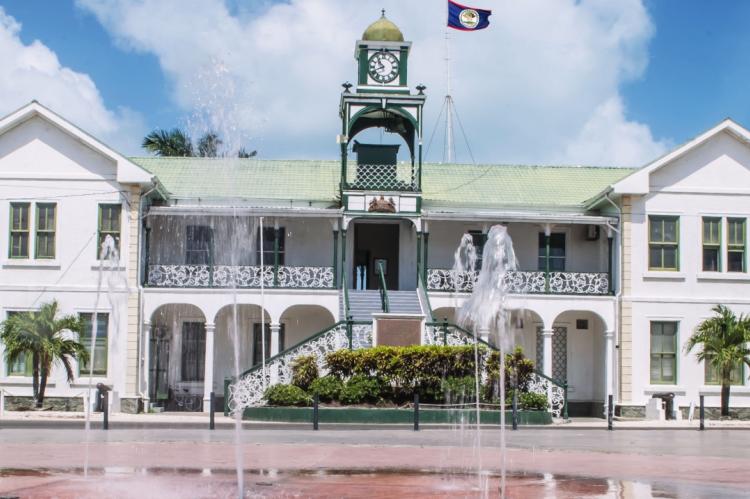📰 High Court and Political Power: Jeremy Enriquez vs. the Judiciary
A New Front Opens in Belize's Fight for Electoral Fairness
By: Omar Silva I Editor/Publisher
National Perspective Belize – Digital 2025
Friday 25th April 2025 | Belize City
Just weeks after the highly contested March 12th General Election, a new chapter has unfolded in the long-running legal battle for electoral fairness in Belize. Jeremy Enriquez, one of the central figures in the redistricting constitutional challenge, is once again in the spotlight—this time turning his attention to the judiciary itself.
On the heels of a failed bid to delay the 2025 election until redistricting was implemented, Enriquez has filed a formal complaint against Justice Tawanda Hondora , the High Court Judge who dismissed his application. The complaint, addressed to Chief Justice Louise Blenman in her capacity as Chair of the Judicial and Legal Services Commission (JLSC) , accuses the judge of judicial misbehavior, misconduct, and corruption .
The allegation is explosive: during a court break in the virtual hybrid hearing, Justice Hondora allegedly left his microphone on, and was overheard saying he had already decided to dismiss the case — a statement that, if true, would indicate prejudice and undermine the foundational principles of judicial impartiality.
🎙️The Alleged Open Mic Moment
According to Enriquez and his attorney, Senior Counsel Anand Ramlogan of Trinidad & Tobago, the judge's remarks were heard not just by Ramlogan's associates in Belize but also by his law firm colleagues abroad. Ramlogan, appearing virtually, informed the judge that the microphone had been left on and that the remarks were overheard by multiple parties. Justice Hondora categorically denied the claim, saying: “Whatever information you have been told is patently incorrect.”
Meanwhile, Senior Counsel Eamon Courtenay , representing the Attorney General, dismissed the allegations as disgraceful and unworthy of the traditions of the Belizean Bar. Courtenay condemned Ramlogan's remarks as “outrageous” and questioned the appropriateness of such allegations being brought by a foreign senior counsel.
But Enriquez has gone further—submitting an unofficial audio recording from the lunch break that allegedly captures a male voice, purported to be that of Justice Hondora, discussing the case in a manner inconsistent with judicial neutrality.
⚖️ Legal Grounds for the Complaint
Enriquez's complaint remains on three main legal pillars:
1. Apparent Bias and Public Confidence
The rule of “justice must not only be done but must also be seen to be done” is a sacrosanct principle in common law jurisdictions. Even the perception that a judge may have reached a decision prematurely is enough to undermine public confidence. If substantiated, Enriquez's allegation of overheard remarks during a live judicial proceeding may fulfill the test of apparent bias.
2. Violations of Natural Justice
Enriquez's letter also alleges that Justice Hondora displayed hostility and unprofessional behavior during the hearing, particularly toward his legal team. Natural justice requires that all litigants be treated with respect, dignity, and impartiality. If the judge's demeanor or conduct compromised the ability of the claimant to be fairly heard, that may form grounds for disciplinary investigation.
3. Oversight and Disciplinary Powers of the JLSC
The Judicial and Legal Services Commission, empowered under Belize's constitutional framework, has the authority to review complaints of judicial misconduct. If it determines there is prima facie evidence, it may:
- Recommend a formal reprimand,
- Impose disciplinary measures,
- In extreme cases, refer the matter to the Governor General for possible removal proceedings under Section 97 of the Belize Constitution.
🧱 The Uphill Battle Ahead
Challenging a sitting High Court judge for misconduct is rare and carries serious weight. Enriquez will have to:
- Authenticate the recording through a proper forensic chain of custody,
- Submit sworn statements witness from those who overheard the alleged conversation,
- Prove that the judge's behavior materially affected the fairness of the hearing and prejudiced the outcome.
Should the matter advance to formal investigation, it would mark an unprecedented review of judicial conduct in Belizean electoral jurisprudence.
🏛️ A Crisis of Institutions?
This development comes on the heels of the government's controversial move to strike out the post-election redistricting case —led by newly appointed Senator and government attorney Hector Guerra. This combination of political manoeuvring and judicial controversy paints a troubling picture for the state of Belize's democracy.
The redistricting matter was never just about electoral boundaries. It was about the rule of law, fairness, and democratic representation. Now, with the judicial system itself under scrutiny, the stakes have escalated into a full-blown institutional showdown.
📣 The People Must Pay Attention
If Jeremy Enriquez's claims are dismissed without proper investigation, it could signal a dangerous normalization of judicial complacency. If they are proven true, it could open the door to a review of the case, and perhaps even reignite the debate about the legitimacy of the 2025 general elections .
At the heart of it all is a basic question: Do Belizeans still trust their democratic institutions to uphold justice, or have politics and power corrupted the last line of defense—the judiciary itself?
The Judicial and Legal Services Commission now faces a critical test. Belize watches. The region watches. And history will remember how this moment was handled.
- Log in to post comments

